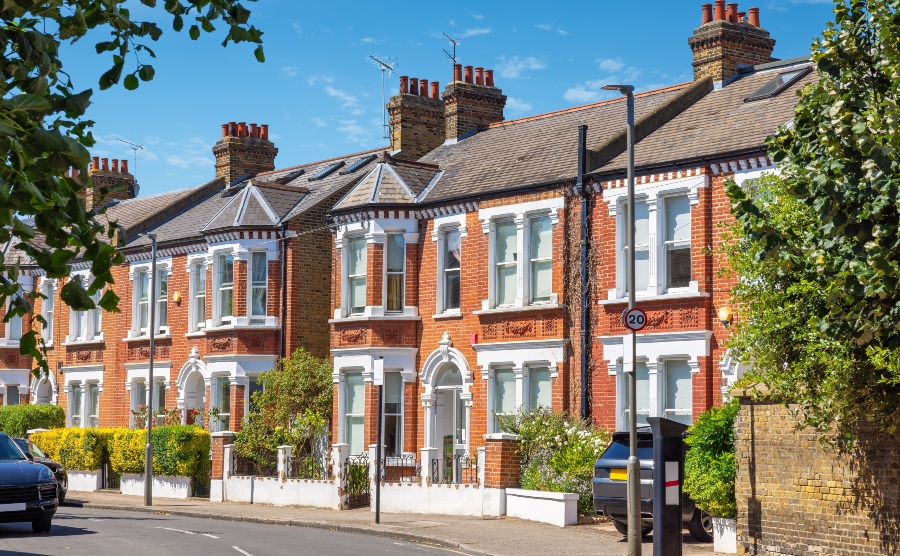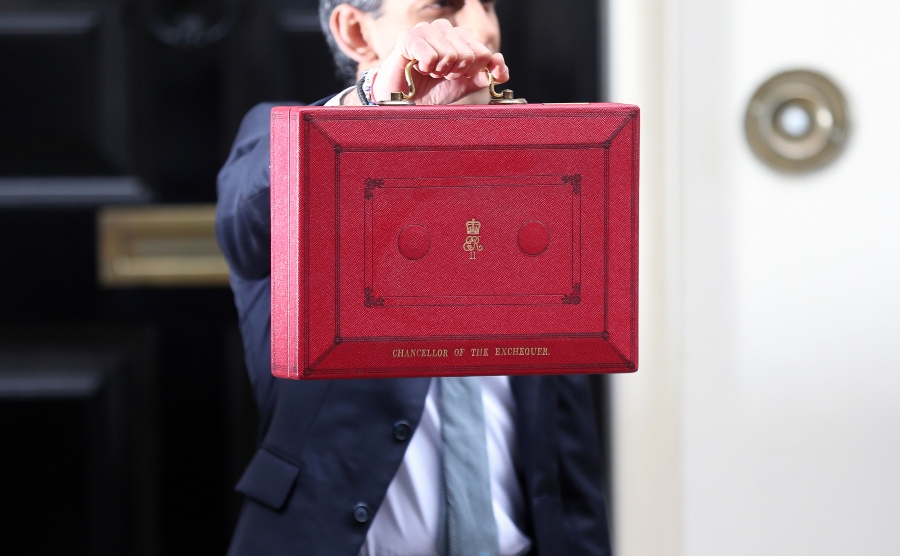Inflation below 2%, expectations for a second and even third interest rate cut before Christmas and a new Labour government keen to shake things up with its first budget – things couldn’t be further from just a year ago.
In tune with this, the UK housing market appears to have turned a corner and is ending 2024 on a positive note. Let’s look at some headline data.

Traditional terraced houses in London
Prices edging upwards
A 2.8% annual rise, equal to £8,000 and the sixth increase in consecutive months, has taken the average price for a UK home to £293,000. This is according to the latest House Price Index from the Land Registry which is based on August figures and provisional estimates. This tallies with Halifax’s latest index for September, which calculates the average cost of a UK home as £293,399, following annual growth of 4.7% (different organisations measure things differently).
Prices are now back to levels not seen since June 2022, confirmed the lender.
Tracking this, the average price of property new to the market in September was £370,759, 1.2% higher than the previous year and 0.8% up on August, said leading portal Rightmove.
But there is a bigger picture. “It is essential to view these recent gains in context,” cautioned Halifax’s head of mortgages, Amanda Bryden. “While the typical value has risen by around £13,000 over the past year, the increase is largely a recovery of the ground lost over the previous 12 months. Looking back two years, prices have increased by just 0.4% (£1,202).”
Country and regional variations
The star performer in terms of price inflation this year has been Northern Ireland, where the Halifax index shows price rises of 9.7 % annually and a current average price of £203,593. Compare this to Scotland, up 2.1% (£205,718), and Wales, up 4.4% (£224,119).
Within England, where the average price is £310,000 (2.3% rise), inflation has been highest in the Northwest, according to the Land Registry. Their prices increased by 4.6% in the 12 months to August 2024. The Southwest was the region with the lowest annual inflation, with prices increasing by 0.8%. Meanwhile, the average house in London now costs £531,212, after an annual increase of 1.4%.

Interest in property prevails despite rising prices
Positive vibes from surveyors
Rising prices are not deterring buyers – they’re embracing improving market conditions, which includes more stock coming to market. The September 2024 RICS Residential Survey shows a positive reading in its demand indicator – i.e. more enquiries from buyers – for the third successive month.
Sales volumes are also positive and there has been an increase in the quantity of new listings on the sales market, confirmed the survey. The RICS survey measures sentiment amongst a representative pool of surveyors nationwide – their overall feeling for the year ahead is an uplift in house prices.
Data backs increased activity
More people are taking mortgages compared to a year ago too. Bank of England figures show there were 43.4% more mortgages approved for house purchases in August 2024 compared to 2023. The 64,858 approvals that month were also 3.4% compared to July 2024.
Echoing this trend, Rightmove highlighted a 14% hike in new sellers in the market in September 2024 compared to 2023. Its September index also revealed that the average number of homes for sale per estate agent is at its highest since 2014 and the number of sales being agreed is up 27% year-on-year.
“The autumn activity has started early,” said Tim Bannister, Rightmove’s Director of Property Science. “The certainty of a new government followed by the first Bank Rate cut in four years invigorated the market, opening a window of opportunity for movers to act. Some of this will be pent-up demand from those who had to hit the pause button until now. Early autumn movers who are acting quickly and taking advantage of the improved market conditions are getting the pick of quality homes for sale. Homeowners who are thinking of coming to market soon shouldn’t let the increased activity make them over-optimistic and must price competitively to sell.”

The Chancellor of the Exchequer holds the famous red leather budget box
All eyes on the Bank of England and Budget
The final months of 2024 could be pivotal in the strength of the UK’s property recovery. Inflation dipping comfortably below two per cent in September combined with weakening wage inflation could mean not one but two more interest rate cuts by the Bank of England this year – on 7th November and then 19th December. Good news for borrowers and the wider property market.
Nervousness about announcements in Labour’s first Autumn budget centres more around second-home owners and landlords, also plagued by the new government’s pending rental reforms, more than primary homeowners.
“A good demand for all types of property at present,”
“A good demand for all types of property at present,” commented a surveyor from agency Gates Parish & Co. “However, some landlords are nervous about the Government’s proposed reforms and are considering withdrawing from the market.”
Similarly, Yorkshire Surveyors Limited reflected: “Landlords are withdrawing if they are able and putting up rents if they are not. Fears over increased taxation and cost burden of regulation are driving this, not capital values.”
You might also like:
- Are cash buyers at an advantage in the UK?
- 10 great places to buy less than an hour from London
- 8 key considerations for new landlords in the UK










